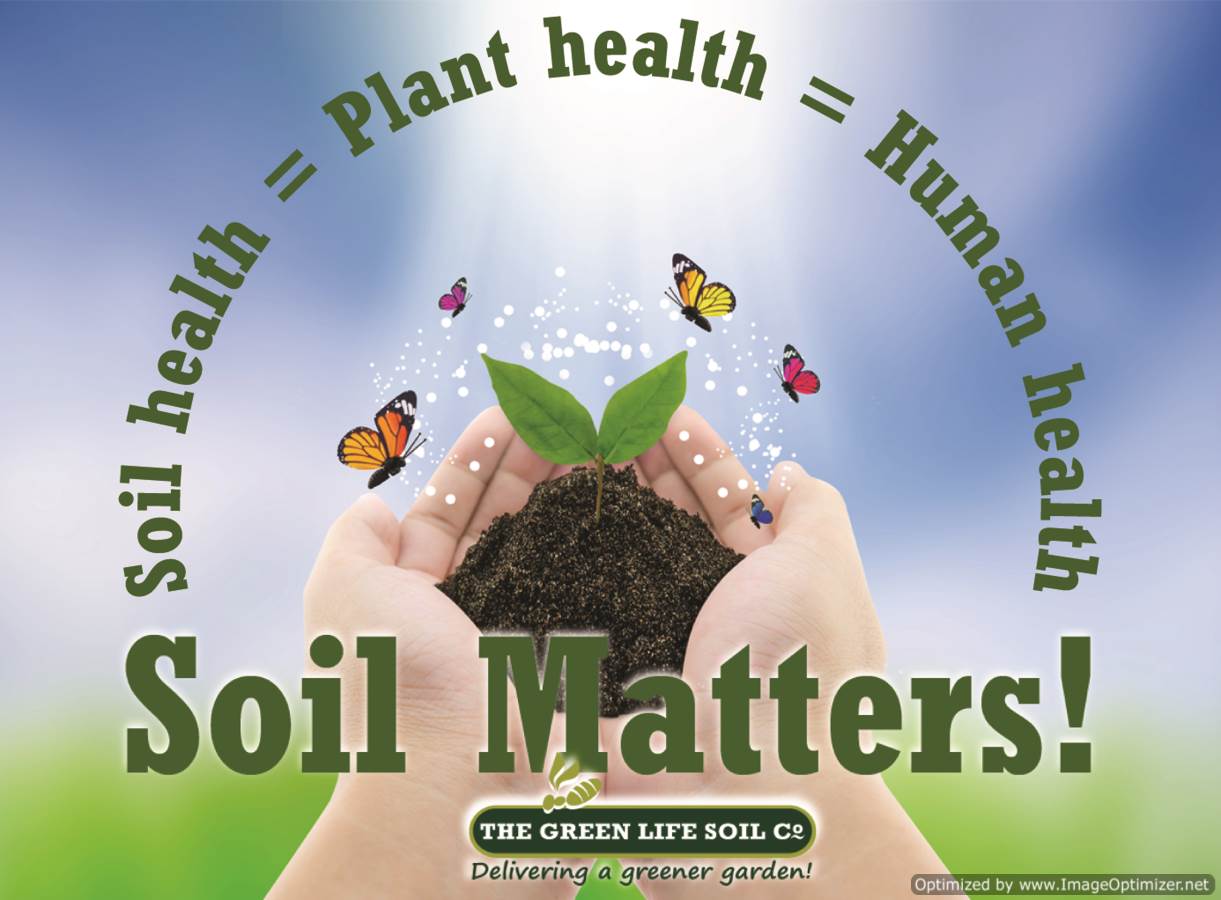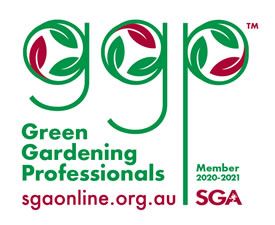| item(s), Total: $0.00 View Cart |
| Shopping cart is empty. |
Did you get to visit the 2018 Perth Garden Festival? The official number through the gate this year was 35,000 people. With lots of plants available for sale, lovely display gardens, a wide variety of expert talks and good weather - I think it made a great day out for greenthumbs! Our theme this year was
Keep your eyes on our 'Events' page - we hope to schedule another one later in the year if you couldn't make it to the recent session. On a completely different note, some customers have been asking recently what happened to Missy - the shop cat. Around Christmas, we decided it was time to retire Missy (who was at least 14 years old, and mostly deaf). She now lives at our In case you're not an avid social media user, you might not be aware of a couple of things coming up: May 5th is deemed World Naked Gardening Day. The first Saturday in May is when things (in the northern hemisphere) are warming up - so obviously the opposite can be true here; but over the last couple of years the "tradition" has been embraced by some even in autumnal Australia as a way to celebrate being part of nature & nature all around us. Thankfully, on Facebook (at least on the sites I visit!) it's all done very tastefully and with a huge amount of humour (no explicit photos are shared!) - so if you'd like a good laugh go (cautiously) and see what you can find. If you're likely to be offended - perhaps stay off Facebook this Saturday. It's safe to visit Green Life Soil Co though - I can promise you we'll be fully clothed. May 6th is International Permaculture Day. This Sunday, keep your clothes ON and get on down to the Growers' Green Farmers' Market (Lefroy Rd, Beaconsfield) 8.30 - 12.00pm. There will be plants for sale and demonstrations & talks on Urban Permaculture throughout the morning. We hope to see you this month @ Green Life. Remember we're open 7 days (early close Sundays @ 2pm) and this is the PERFECT time to get all your garden products and soil sorted before the rains come. Shop online 24/7 or organise bulk deliveries over the phone. Too easy!
In this newsletter:Useful Reminder - May Jobs in the Garden
What to Plant Now May Jobs in the Garden
What to Plant NowThere are lots of yummy winter vegies (and greens!) you can grow at this time of year. See our 'When to Plant' guide here for our month by month growing info. It's a great time of year to put these babies in your garden:-
Seed potatoes have just arrived. They are Certified Organic (sourced from a Manjimup grower) and we have the following types available: Dutch Cream, Eureka, Delaware & Ruby Lou. Not sure how best to grow potatoes? Check out our fact sheet right here! There's still time to plant most of your winter vegies from seed - considering the season's 'late' this year... but be aware some slower growing brassicas (cauliflower and in particular brussels sprouts) might not fare so well. Perhaps look for seedlings to give yourself a head start. Pest & Disease Tip - Scale
Scales are sap-sucking insects that insert their tiny, straw-like mouth parts into bark, fruit, or leaves. Some scales can seriously damage their host, while other species are more of an unsightly annoyance - particularly if the sooty mould fungus is present too (more on that in a minute). The presence of scales can be easily overlooked, mostly because they do not resemble most other insects. They are non-mobile as adults, and appear as small lumps - often found along the stem and trunk, and underside of leaves along the central veins in particular. They can be tiny or up to a few millimetres across. Some are brown, some are white and waxy looking, and others are black or red. Scale spreads from plant to plant as newly hatched crawlers, which are very tiny, have legs and can move around. Once the crawlers have settled down to feed, they create their protective 'scale' covering and are immobile. (Photo above right is White Wax Scale - Photo by Faye Arcaro)
Organic control of Scale is achieved by thorough spraying of horticultural oil over the insects; effectively smothering them. Eco oil and Neem oil are considered appropriate treatments. The oil coats the scale insects and clogs their breathing pores. The insects are suffocated rather than being killed by a toxic material. For proper control, it is critical to apply the oil spray over every surface of the plant where scale are present. If the insects are on the underside of the leaves and the oil is only applied to the upper surface, it will have no effect on them. Often, the female will have eggs protected under her body. Although the oil may be effective on her, the eggs may still hatch out underneath - so a second, and even a third, application should be made 10-14 days apart (do follow label directions) to deal with successive generations as they hatch. Be careful when using any oil-based spray in warm weather (anything over about 30 degrees) to avoid 'cooking' the leaves. For a simple home-made version of an oil spray treatment - see our fact sheet here. Certain scale problems on large plants or those especially sensitive to scale damage may warrant the application of a systemic insecticide (not considered an organic approach).
Scale insects are farmed by ants, who feed on the secreted 'honey dew' put out by scale. Ants play a role in the spread of scale insects, so keep your eyes open for increased ant activity. This sticky 'honey dew' secretion often grows a fine black mould (hence the name 'Sooty Mould'). While this isn't a disease as such, and won't actually harm your plants - it is unsightly, and does reduce the plant's ability to photosynthesise. By treating the scale, you can eliminate the sooty mould. (Thank you to Faye Arcaro for the fantastic photos. Tune into 'Let's Talk Gardening' on Curtin 100.1 fm Saturday mornings 8 - 10am to hear Faye & her guests discuss issues of importance to Perth gardeners.)
Indoor Plants - bring your garden inside this winter!!
With many people having smaller gardens (or no garden at all in apartment living); for people to have something green and living is still a way they can nurture something and interact with nature. There are proven benefits of indoor plants for air quality, stress reduction and mental health. A recent study (click here to read more) claims that one indoor plant in a medium sized room (4m x 5m) can improve air quality by 25%! While this statistic can vary hugely on so many factors - there is also some evidence that shows soil micro-organisms play a part in removing VOC's (volatile organic compounds - airborne pollutants) from our homes and offices. While plant species behave differently in this regard, the usual belief is that the larger a leaf's surface, the more effective at air cleaning the plant will be. Several years ago now, NASA were looking at plants' abilities to purify air (looking at their potential in confined environments like the International Space Station, etc). Their comparison of a number of indoor plants can be found here. (And it's a good checklist of suitable plants to take plant shopping, too!) While there isn't technically a true "indoor plant" (given that all plants originated outdoors somewhere) - there are some plants that will survive and thrive if you look after them well in "artificial conditions" inside buildings.
Other understory plants like some ferns (those originating from tropical areas) do well in a humid environment like a bathroom. Windows often are frosted glass so the light is diffused but adequate for plants to thrive assuming their basic needs are met. The trick to many indoor plants is getting the watering right. Many times indoor plants are killed through OVER watering (rather than under watering). Indoor plants aren't exposed to sunlight or temperature extremes like their outdoor relatives; so transpiration/evaporation can be much less. Contrary to what you'd expect - often indoor plants need MORE water in winter than summer - our artificial heating tends to dry out the air faster. Keeping up air humidity around our plants can be simple. You can spray them every couple of days with a misting bottle, or another tip is to get a small-ish jar or decorative glass, fill it with shells or fairy stones (or something pretty!) and then top it up with water. Tuck this somewhere around your plants and top up the water from time to time. Depending on where the plant originated (as usual - do a bit of research!) - you'll get a clue as to how much moisture it requires. Some plants like Dracaena and Sansevieria definitely don't like wet feet and prefer to dry out a little between waterings.
If you notice small little flies around your indoor plants - these are fungus gnats; and they're usually another sign that soil is being kept too damp. They won't harm your plant, but are attracted to rotting organic matter in your potting soil. Allowing the surface of the pots to dry out between watering will stop them - as they breed in the top layer of damp soil. (Again - self watering pots are good for preventing this!) If you have an infestation, one of the best ways to deal with them is place a small dish of balsamic vinegar or wine near the pot plant. They will be attracted to the fermented scent and kamikaze into it. A dusting of diatomaceous earth could also be useful on the soil surface. Avoid the temptation to slop your tea leaves or coffee grinds onto your indoor pot plants as this promotes the fungus gnats too. Make sure your indoor plants are kept out of temperature extremes like beneath aircon vents, away from heaters, direct heat through windows, etc. A hot OR cold draft is not going to do them much good.
Many plants not considered usual for indoor plants can be given a short spell indoors (from a few days to months - depending on hardiness). You can bring in things when in flower, or your favourite succulent bowl - for a short while at least, so you get to enjoy them. Another trick is when buying certain plants - buy TWO! You can swap them over and spell them outdoors for a while; keeping them on rotation. (Pictured above is Devil's Ivy - a popular and hardy trailing indoor plant that is easy to grow from cuttings.)
The biggest pest issue with indoor plants is usually mealy bug or scale insects. Both are best treated with eco oil (read the article on treating scale above!) - but if infestations are small you can scrape them off plants gently with your fingernail or lightly using a plastic dish scourer (not so hard that you damage the plant!). Dabbing methylated spirits onto mealy bug with a cotton bud is also highly effective (and somewhat satisfying!). Like any plant in your garden - some indoor plants can be toxic to children and pets if eaten. If this is a concern, do some research to make sure your plant selection is suitable for your needs.
With regard to pots - there are so many different kinds available you're bound to find something that suits your individual taste and your home. Many decorative pots for indoors don't have drainage holes, While the benefit of this is you won't get leakage onto your furniture, the downside is you have the potential for waterlogging too. Either make sure you carefully monitor watering, use large chunks of something (rocks, large charcoal pieces - even polystyrene chunks) in a decent layer at the bottom to be something of a drainage well, or just use the decorative pot as a 'sleeve' - standing a regular pot (with drainage holes) inside it. Use an upturned pot or something similar if you need to raise the height of your plant. If you need to disguise this, some riverstones, shells, coarse coconut fibre, etc. can be used on top as a mulch to hide the plastic pot. This method makes it easy to swap over your plants too. If you use a regular pot with drainage holes, make sure your saucer is sealed (unsealed terracotta can still transfer moisture to surfaces below) and check to see that it doesn't remain full of water hours after you've watered your plants (a sign you're over watering). So this winter - why not get hip, get potty and bring some of your garden INDOORS to enjoy? For great selections on indoor plants, a number of our retail stockists listed below have an awesome range (check out Beaufort Garden World, Guildford Town Garden Centre & Garden Elegance for example. I have visited each of these retailers recently and they have gorgeous things to choose from). April Photo Contest
So remember to keep those photos coming in, people! A winner is picked at random each month for a $50 voucher - so why not share the joy of your garden and maybe get some free garden goodies as a bonus! People really do love getting inspiration and ideas from what others are doing & growing; and it helps us as a business as people can see results of our products being used. Photos can be shared to our Facebook page (Green Life Soil Company) or sent in via email. VIP Special Offer - May 2018
So if you haven't already had the opportunity - here's your chance. VIP members for the month of May 2018 can buy Lucerne Pellets at the discounted rate of $25 per 15kg bag (normally $29). Offer is available via the VIP members' sign in area for online shopping - and in store (but please remember to ASK for the VIP discount). These are locally made and an ideal way to feed and mulch your pots, hanging baskets, roses, vegie gardens - pretty much anything! Simply sprinkle a thin layer of pellets over the soil surface. The pellets will expand and break down once watered, and form a layer of lucerne on top of the soil. This doesn't blow away, but also allows water to penetrate, and acts as a great insulator/protector for the soil life below. Lucerne seems to stimulate protozoa in the soil; which is a food source for worms - so in a month or two you'll probably find a lot more worms below the lucerne pellet mulch. (In some conditions, you may also see fungal activity. Be aware this is not a disease that will harm your plants and is a sign of healthy soil!) So hop in quick and grab a sack (or two). One bag will cover 4-5m2 - depending on how thickly you apply it. (FYI - Lucerne straw is also available; if you prefer the traditional approach!)
Retail Stockists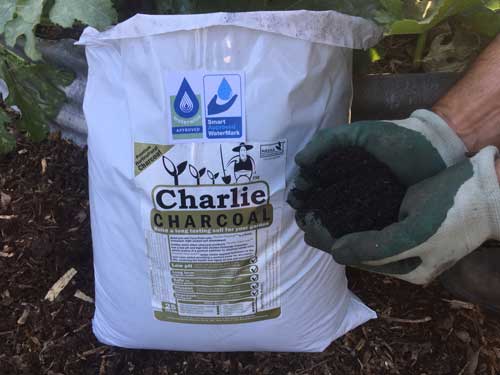 Please support the local independent businesses who support Green Life. You'll find great advice and service close to home. Please support the local independent businesses who support Green Life. You'll find great advice and service close to home.Remember to check with individual stockists what products they currently have in stock - as it will vary between retailers:
|



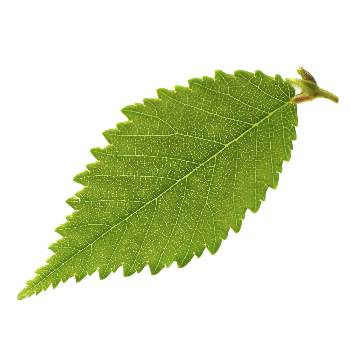 How is it May already? Wow. We've still been enjoying some warmer days; and there's not been much rain as yet - so it feels like Autumn is yet to happen in earnest; although the night time temperatures are getting lower and the days are definitely shorter. I do miss the opportunity to get outside in the garden after work - but the upside is we get to eat dinner before 9pm!!
How is it May already? Wow. We've still been enjoying some warmer days; and there's not been much rain as yet - so it feels like Autumn is yet to happen in earnest; although the night time temperatures are getting lower and the days are definitely shorter. I do miss the opportunity to get outside in the garden after work - but the upside is we get to eat dinner before 9pm!! .JPG) Speaking of soil improvement, last Sunday we held our first Waterwise Gardening Workshop sponsored by the Water Corporation. It was a fun morning where we looked at different Perth soil types, and played with a number of soil improvers to see how they worked. Attendees got to take home some product samples to trial and new ideas to help have a greener garden using less water.
Speaking of soil improvement, last Sunday we held our first Waterwise Gardening Workshop sponsored by the Water Corporation. It was a fun morning where we looked at different Perth soil types, and played with a number of soil improvers to see how they worked. Attendees got to take home some product samples to trial and new ideas to help have a greener garden using less water..JPG) home and - we're quite sure - thinks she's died and gone to heaven. Her territory consists of the couches and my son's bed - and she shows no interest whatsoever in venturing outdoors. Our existing house cat has grudgingly accepted her and the dog couldn't care less... so it's been a smooth transition for her really.
home and - we're quite sure - thinks she's died and gone to heaven. Her territory consists of the couches and my son's bed - and she shows no interest whatsoever in venturing outdoors. Our existing house cat has grudgingly accepted her and the dog couldn't care less... so it's been a smooth transition for her really..JPG) So for May - happy gardening (clothes optional!)
So for May - happy gardening (clothes optional!) .JPG) Compost! Use all those leaves to make a compost pile. People often ask whether gum leaves are any good to use - the answer is YES - if you've got them, why not see them as a resource? It is true they take longer to break down. Ideally, mulch them or put them on the ground and run the mower over them to break them up. Broken up gumleaves will decompose faster than whole ones will. Make up 'lasagne' compost piles - adding layers of gum leaves, water, a handful of blood & bone or a THIN layer of manure, some different material if possible (eg. food scraps or lawn clippings) and repeat. I have found it necessary to turn the piles and make sure that adequate moisture is there. If piles are left to do their own thing the outsides (in particular) don't decompose; the inside of the pile might but to get things happening quickly, check & turn once a month at least. I have read varying articles about the pro's and con's of using eucalyptus leaves on your garden; but I can't say I've seen any ill effects from using mature compost made from gum leaves. If you've got access to softer, deciduous leaves mix them with the eucalyptus leaves to help the pile get going faster. (Pictured right - decomposed gum leaves, gumnuts, sticks - etc.) For more ideas on compost making,
Compost! Use all those leaves to make a compost pile. People often ask whether gum leaves are any good to use - the answer is YES - if you've got them, why not see them as a resource? It is true they take longer to break down. Ideally, mulch them or put them on the ground and run the mower over them to break them up. Broken up gumleaves will decompose faster than whole ones will. Make up 'lasagne' compost piles - adding layers of gum leaves, water, a handful of blood & bone or a THIN layer of manure, some different material if possible (eg. food scraps or lawn clippings) and repeat. I have found it necessary to turn the piles and make sure that adequate moisture is there. If piles are left to do their own thing the outsides (in particular) don't decompose; the inside of the pile might but to get things happening quickly, check & turn once a month at least. I have read varying articles about the pro's and con's of using eucalyptus leaves on your garden; but I can't say I've seen any ill effects from using mature compost made from gum leaves. If you've got access to softer, deciduous leaves mix them with the eucalyptus leaves to help the pile get going faster. (Pictured right - decomposed gum leaves, gumnuts, sticks - etc.) For more ideas on compost making, .JPG) Plant some natives. Autumn is a great time to establish a native garden that promotes birds, beneficial insects and biodiversity. If you're looking at removing lawn and putting in a low-maintenance verge garden, visit a good specialist nursery (like our good friends at Zanthorrea) and choose suitable plants that will thrive in your soil type & area. Planting natives in autumn gives them a chance to get established before the heat of summer - especially if you prepare the soil well. (Pictured right - Grevillea. There are many forms/sizes available - flowers are loved by nectar eating birds.)
Plant some natives. Autumn is a great time to establish a native garden that promotes birds, beneficial insects and biodiversity. If you're looking at removing lawn and putting in a low-maintenance verge garden, visit a good specialist nursery (like our good friends at Zanthorrea) and choose suitable plants that will thrive in your soil type & area. Planting natives in autumn gives them a chance to get established before the heat of summer - especially if you prepare the soil well. (Pictured right - Grevillea. There are many forms/sizes available - flowers are loved by nectar eating birds.) Asian greens (bok choi, pak choi, Hong Kong broccoli, tatsoi etc.) Asparagus, Broad beans, Broccoli, Cabbage, Carrots, Cauliflower, Celery, Celeriac, Chives, Coriander, Daikon, Dill, Garlic, Kale, Kohl rabi, Leek, Lettuce, Onion, Parsley, Peas, Potatoes, Radish, Rocket, Silverbeet, Snow peas, Spinach, Spring onions, Swede, Turnip.
Asian greens (bok choi, pak choi, Hong Kong broccoli, tatsoi etc.) Asparagus, Broad beans, Broccoli, Cabbage, Carrots, Cauliflower, Celery, Celeriac, Chives, Coriander, Daikon, Dill, Garlic, Kale, Kohl rabi, Leek, Lettuce, Onion, Parsley, Peas, Potatoes, Radish, Rocket, Silverbeet, Snow peas, Spinach, Spring onions, Swede, Turnip.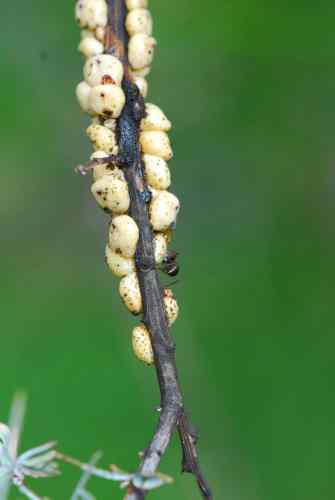 Scale are a common insect pest of many ornamental plants, fruit trees and indoor plants.
Scale are a common insect pest of many ornamental plants, fruit trees and indoor plants. .JPG) Scale insects, when abundant, can weaken a plant and cause it to grow slowly. Infested plants appear stressed, with leaves turning yellow (and they may drop prematurely), and plant parts that remain heavily infested may die. (Photo right is red scale on citrus leaf - note the yellow areas where tissue damage is occurring)
Scale insects, when abundant, can weaken a plant and cause it to grow slowly. Infested plants appear stressed, with leaves turning yellow (and they may drop prematurely), and plant parts that remain heavily infested may die. (Photo right is red scale on citrus leaf - note the yellow areas where tissue damage is occurring)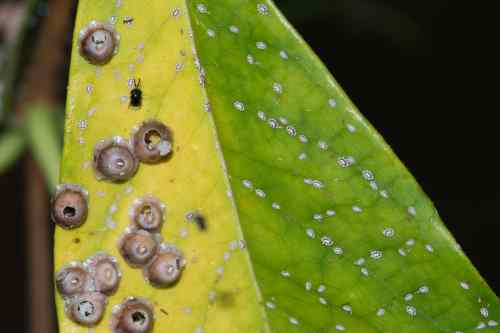 To keep your plants scale free, provide plants with good growing conditions so they are more resistant to scale damage. You can prune off heavily infested leaves and branches if they are limited to a few parts of small plants. Pruning shrubs and trees to open up canopies can reduce populations of scale by making conditions less ideal. Any plants that are repeatedly and constantly affected should probably be replaced with something less susceptible. Scale do have natural predators - wasps in particular, but also ladybirds and mites. If your infestation isn't too servere - perhaps keep it under observation and wait for the predators to arrive. Using sprays will have a detrimental effect on them - so any 'icide' treatment should be a last resort. The photo to the right (again courtesy of Faye Arcaro) shows Fig Wax Scale that have been parasitized by wasps. The smaller white dots are the scale larvae or 'crawlers'. You can see they attach to the leaf veins where the sap is readily available (and again the tissue damage to the section of the leaf where the adults are present is obvious). Fig Wax Scale don't just affect figs - this leaf is from a Native Frangipani.
To keep your plants scale free, provide plants with good growing conditions so they are more resistant to scale damage. You can prune off heavily infested leaves and branches if they are limited to a few parts of small plants. Pruning shrubs and trees to open up canopies can reduce populations of scale by making conditions less ideal. Any plants that are repeatedly and constantly affected should probably be replaced with something less susceptible. Scale do have natural predators - wasps in particular, but also ladybirds and mites. If your infestation isn't too servere - perhaps keep it under observation and wait for the predators to arrive. Using sprays will have a detrimental effect on them - so any 'icide' treatment should be a last resort. The photo to the right (again courtesy of Faye Arcaro) shows Fig Wax Scale that have been parasitized by wasps. The smaller white dots are the scale larvae or 'crawlers'. You can see they attach to the leaf veins where the sap is readily available (and again the tissue damage to the section of the leaf where the adults are present is obvious). Fig Wax Scale don't just affect figs - this leaf is from a Native Frangipani. .JPG) So it's a thing. Once again, indoor pot plants are essential and desirable items. (And if you're REALLY hip - you'll probably have them in a macrame plant hanger too - but I digress.) But it's not a bad thing. Personally I think the humble spider plant or devil's ivy cutting may well be the "gateway drug" for gardeners of the future - so let's take a closer look at this trend!
So it's a thing. Once again, indoor pot plants are essential and desirable items. (And if you're REALLY hip - you'll probably have them in a macrame plant hanger too - but I digress.) But it's not a bad thing. Personally I think the humble spider plant or devil's ivy cutting may well be the "gateway drug" for gardeners of the future - so let's take a closer look at this trend!.JPG) The biggest issue with indoor plants is the availability of light - given that most indoor positions don't provide enough for photosynthesis. Naturally, understory plants and slower growing plants can survive with less light. Aspidistra (known as 'Cast Iron Plant' - pictured right) has been a popular indoor plant since Victorian times - and is one of the best to survive in low light conditions. Native to China & Vietnam, this plant is an understory plant. It survives periods of dryness so is not likely to turn up its toes quickly if you forget to water it. Watch out for scale and mealy bug, and dust the leaves occasionally to keep it looking good. (Below right is another shot of the aspidistra - sitting on our patio - and someone I found hiding among the foliage! I'm not sure who got the biggest fright when I started moving the pot to take the photographs!)
The biggest issue with indoor plants is the availability of light - given that most indoor positions don't provide enough for photosynthesis. Naturally, understory plants and slower growing plants can survive with less light. Aspidistra (known as 'Cast Iron Plant' - pictured right) has been a popular indoor plant since Victorian times - and is one of the best to survive in low light conditions. Native to China & Vietnam, this plant is an understory plant. It survives periods of dryness so is not likely to turn up its toes quickly if you forget to water it. Watch out for scale and mealy bug, and dust the leaves occasionally to keep it looking good. (Below right is another shot of the aspidistra - sitting on our patio - and someone I found hiding among the foliage! I'm not sure who got the biggest fright when I started moving the pot to take the photographs!)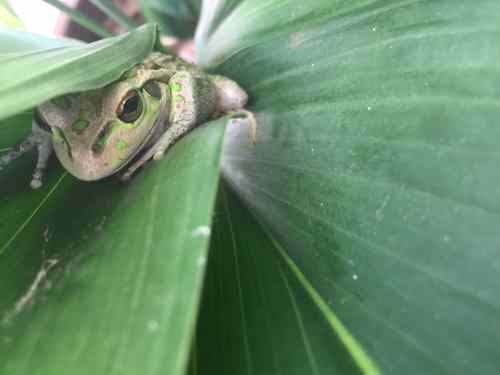 Self watering pots are a good idea if you tend to be a bit heavy handed with the watering. Keep the reservoir topped up, but (once established) allow the plant to drink as it needs to. Never keep your indoor plants sitting in a saucer of water, as it will cause waterlogging and death of most plants. If the outside edge (leaf margins) of your plants is going soft and browning off, this is usually a sign you're over watering.
Self watering pots are a good idea if you tend to be a bit heavy handed with the watering. Keep the reservoir topped up, but (once established) allow the plant to drink as it needs to. Never keep your indoor plants sitting in a saucer of water, as it will cause waterlogging and death of most plants. If the outside edge (leaf margins) of your plants is going soft and browning off, this is usually a sign you're over watering.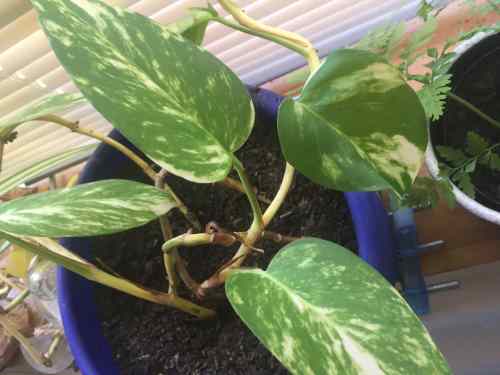 Dust is another issue with indoor plants. Accumulation of dust can clog plant leaf openings and can (in extreme cases!) affect the ability of plants to photosynthesise. Wipe down the leaves from time to time with a damp cloth (water only!) or a little eco oil to give them a bit of a shine. Another good trick is to put them out in rain showers for a short while. It will freshen up the leaves, soak the soil and perk them up! Just remember not to leave them outdoors for too long if the overnight temperatures are very cold & if the plant has been coddled somewhere sheltered indoors - the shock won't be kind to the plant.
Dust is another issue with indoor plants. Accumulation of dust can clog plant leaf openings and can (in extreme cases!) affect the ability of plants to photosynthesise. Wipe down the leaves from time to time with a damp cloth (water only!) or a little eco oil to give them a bit of a shine. Another good trick is to put them out in rain showers for a short while. It will freshen up the leaves, soak the soil and perk them up! Just remember not to leave them outdoors for too long if the overnight temperatures are very cold & if the plant has been coddled somewhere sheltered indoors - the shock won't be kind to the plant.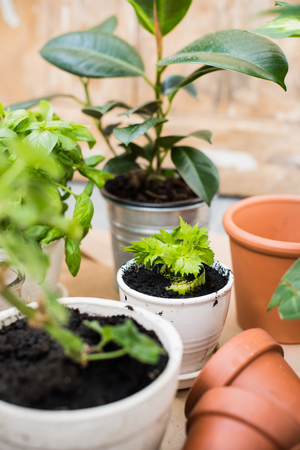 Just remember if you move an indoor plant outside for a "holiday" - never stick it out in the direct sun or in brutal conditions (extreme temperature days). Keep your indoor plants (when outdoors) in good indirect light - under a patio or a tree is ideal; as long as it isn't too dark.
Just remember if you move an indoor plant outside for a "holiday" - never stick it out in the direct sun or in brutal conditions (extreme temperature days). Keep your indoor plants (when outdoors) in good indirect light - under a patio or a tree is ideal; as long as it isn't too dark.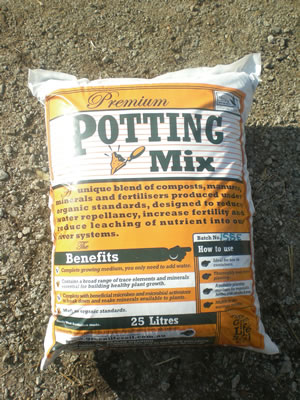 As far as potting mixes go, any good quality potting mix should be suitable (including our Certified Organic Premium Potting Mix); just monitor it to see how much water it holds, and adjust your watering regime accordingly (your finger poked into the soil makes an excellent moisture meter!). Fertilse your indoor plants sparingly - a good quality mix should have enough slow release nutrition to keep your plants healthy for 6-12 months (remember they tend to be slower growing and that means they don't need lots of nutrients). Personally, I like to re-pot indoor plants probably every 12-18 months to freshen up soil, upsize the pot (only if rootbound), and to trim up the foliage if needed. It may not be necessary - but remember your indoor plants are a living thing and will respond well if given a little TLC. If giving them a spell outdoors, a light liquid feed is a good idea (worm wizz or kelp fertiliser), or use a slow release fertliser (like Growsafe) if indoors. Don't use smelly organic fertilisers like fish hydrolysate or manures unless you can leave them outdoors for a few days for the smell to settle. Not that the plant will mind - but your family might.
As far as potting mixes go, any good quality potting mix should be suitable (including our Certified Organic Premium Potting Mix); just monitor it to see how much water it holds, and adjust your watering regime accordingly (your finger poked into the soil makes an excellent moisture meter!). Fertilse your indoor plants sparingly - a good quality mix should have enough slow release nutrition to keep your plants healthy for 6-12 months (remember they tend to be slower growing and that means they don't need lots of nutrients). Personally, I like to re-pot indoor plants probably every 12-18 months to freshen up soil, upsize the pot (only if rootbound), and to trim up the foliage if needed. It may not be necessary - but remember your indoor plants are a living thing and will respond well if given a little TLC. If giving them a spell outdoors, a light liquid feed is a good idea (worm wizz or kelp fertiliser), or use a slow release fertliser (like Growsafe) if indoors. Don't use smelly organic fertilisers like fish hydrolysate or manures unless you can leave them outdoors for a few days for the smell to settle. Not that the plant will mind - but your family might.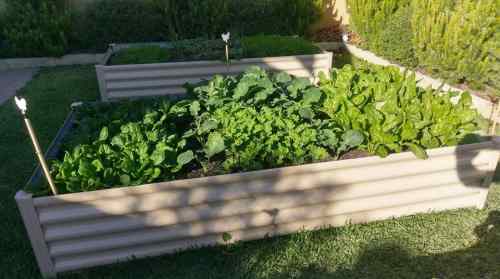 Our April photo contest winner is Adam Tate. Adam has sent us in a number of photos over the past year or so - here's one from almost twelve months ago in his vegie garden. His comments were: "5 weeks after sowing seed in your vege mix. From the left, bok choi, kale with broccoli behind in the centre, and spinach on the right. Also carrots in the other bed behind."
Our April photo contest winner is Adam Tate. Adam has sent us in a number of photos over the past year or so - here's one from almost twelve months ago in his vegie garden. His comments were: "5 weeks after sowing seed in your vege mix. From the left, bok choi, kale with broccoli behind in the centre, and spinach on the right. Also carrots in the other bed behind."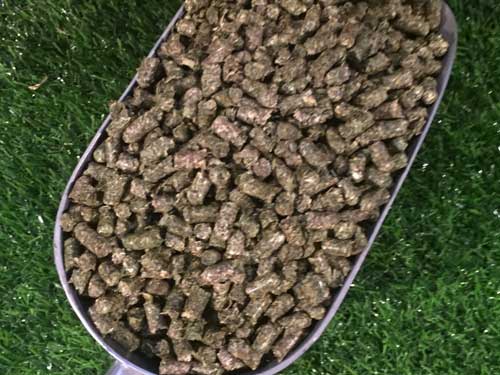 Lucerne Pellets! Our display at the Perth Garden Festival of the Lucerne Pellets caused a lot of interest as people were keen to handle then, sniff them, find out more about them and buy them!
Lucerne Pellets! Our display at the Perth Garden Festival of the Lucerne Pellets caused a lot of interest as people were keen to handle then, sniff them, find out more about them and buy them!